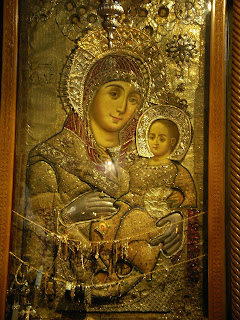New Year's Day
 Icon Church of the Nativity Bethlehem
Icon Church of the Nativity BethlehemHelen Suzman was a relentless critic of South Africa's Nationalist government. For 13 years, as sole member of the Progressive Party in parliament, she was the only MP to speak out against racial segregation, at a time when only the white minority enjoyed the right to vote.
Born in 1917 to Jewish immigrants from Lithuania, she married Dr Moses Suzman, who became one of South Africa's leading physicians.
Five years after graduating from Witwatersrand University, she joined the staff as a lecturer in economic development.
Helen Suzman's interest in disadvantaged urban Africans increased after she became a member of the South African Institute of Race Relations.
She began to take an active role in politics after the 1948 election, when the mildly liberal United party was replaced by the National party, with its rigid policy of apartheid.
Racial discrimination
In 1952, standing for the United party, she was elected to the House of Assembly as the Member for Houghton, a prosperous and largely-Jewish suburb near Johannesburg.
An undaunted fighter for freedom
But, in 1959, Mrs Suzman was one of 12 liberal MPs who broke away to form the Progressive party, which called for the right of all, regardless of race and creed, to take part in government "in accordance with their degree of civilisation".
But in the general election of October 1961, Helen Suzman was the only one of these members to retain her seat.
She was the only candidate, since the first South African parliament was established in 1910, to be elected by a white constituency on a platform that clearly rejected racial discrimination.
Government 'bullies'
As the lone voice of real opposition in parliament, Mrs Suzman spoke out against such measures as the 90-day detention law of 1963, which, she maintained, brought South Africa "further into the morass of a totalitarian state".
At a public rally in Johannesburg in 1966, she condemned the use of arbitrary powers by the justice minister and excoriated the government as "narrow-minded, prejudiced-ridden bullies".
I hate bullies and like simple justice
Helen Suzman
Her conception of a multi-racial society did not insist on immediate universal suffrage, but envisaged the right to vote for those who had had seven years of schooling, or four years of schooling and two years of employment.
Although Helen Suzman was re-elected in 1966, the accession of John Vorster as Prime Minister after the assassination of Hendrik Verwoerd appeared to herald little change in the repressive policies of apartheid.
Opposed sanctions
The antipathy between her and another leader, President PW Botha, dated back to Verwoerd's murder in parliament in 1966, when an enraged Botha screamed in Mrs Suzman's face: "You liberals have done this - now we're going to get you!"
Botha was a bitter enemy
Mrs Suzman visited Nelson Mandela in jail and was warned by PW Botha about contacts with opponents of the South African regime.
But her opposition to sanctions against South Africa lost her friends among radical black people. She believed that isolating South Africa would not solve any of its racial problems, and would harm the black population and neighbouring African states.
International honours
In 1989, Mrs Suzman announced her resignation. One of her last actions as an MP was a motion to impeach a judge who imposed a suspended prison sentence on a white farmer found guilty of beating a black labourer to death.
It had no chance of success, but Helen Suzman eventually won her argument with white MPs that apartheid could not be maintained indefinitely.
Her work was recognised by many honours from many countries. She won the United Nations Human Rights award in 1978 and the Queen made her an honorary Dame in 1989.
When she received a degree from Oxford University, the then Chancellor, Harold Macmillan, described Helen Suzman as an "undaunted champion of freedom".
Helen Suzman was a truly great person. I never met her and I believe a street was named after her in Johannesburg.
We went by train to the cathedral for Mass of the Solemnity of Mary, Mother of God. The Cardinal celebrated with 4 concelebrating priests and spoke of his retirement. Afterwards I thanked him for editing "Today" which we had heard on Iplayer and much enjoyed. Edward Henley also featured. At the crib we met Victoria and her parents fresh back from Bethlehem. They said the town had been tense.
Saw a sale at Moss Bros and bought a Pierre Cardin suit as my 2 suits are both looking shiny.
Watched the rest of "Hansel and Gretel" Songs of Praise, Antiques roadshow and the New Year's day concert from Vienna conducted by Daniel Barenboim with great panache and humour. Liz is watching the excellent Mills and Boon novels film. I am appalled by Peter Godwin's account of Zimbabwe "When the crocodile eats the sun" - recommended by John Fulton. The world is in such a terrible state.

Comments